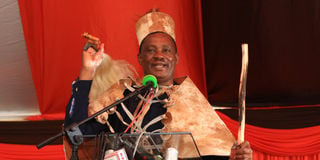Premium
Kagwanja write-up on the Muturi coronation and conflict of interest

National Assembly Speaker Justin Muturi addresses the Kikuyu Council of Elders after he was crowned Mt Kenya spokesman at the Agikuyu Mukurwe wa Nyagathanga shrine in Murang'a County on May 22, 2021.
What you need to know:
- Prof Kagwanja was one of the elders who crowned Mr Muturi as the Mount Kenya region political and cultural supremo.
- Prof Kagwanja fell short of the requirement of full disclosure expected from all those who write opinion for the Nation.
Nation opinion columnists are a privileged group who owe their first loyalty to readers. The main purpose of their columns is to provide a diversity of views and “to help readers better understand the issues that are part of their everyday lives.” That is how NMG editorial policy describes their function.
Therefore, it would be unseemly for columnists to use the space given to them to serve their own or other special interests, such as campaigning for a political candidate.
However, columnists are not reporters; they are commentators. They are not held to the same high standards of objective journalism as news reporters. They are given more leeway to analyse and interpret facts. They can also be involved in public issues and write about them.
But they are expected to be transparent and ethical. They are expected to disclose any information that could affect readers’ understanding of their messages or arguments. Otherwise they would be seen as propagandists, campaigners, publicists, spin doctors and suchlike.
They must avoid conflicts of interest or the appearance of any conflicts of interest. They must provide full disclosure and avoid conflicts of interest. This is a basic tenet in ethical journalism.
It is for this reason that Peter Kagwanja’s opinion piece in the last Sunday Nation provides an interesting case study on the question of disclosure and avoidance of conflict of interest in opinion columns. The article, ‘Shrines the new sites of bruising political battles ahead of Uhuru exit’, does not disclose he was one of the organisers of the controversial coronation of National Assembly Speaker Justin Muturi as the new kingpin of politics in the Mt Kenya region.
Should he have disclosed the information? Did it matter? Was it relevant? Did the non-disclosure create a conflict of interest?
Integrity of his writing
The coronation, which has been dismissed by many politicians from the region as being of no political consequence, was conducted on Saturday by the Kikuyu Council of Elders at Mukurwe wa Nyagathanga shrine in Murang’a. Since December 2019, Prof Kagwanja has been a card-carrying patron of the Council of Elders in Murang’a.
A public intellectual who has a doctorate in history and politics, he provides the intellectual and philosophical underpinnings for the Council of Elders movement. He was one of the elders who crowned Mr Muturi as the Mount Kenya region political and cultural supremo.
Prof Kagwanja should have disclosed to readers his participation in the coronation because that information is relevant in helping readers to evaluate his opinion column. It is also information needed to show full disclosure in the absence of which it could indicate a hidden conflict of interest and readers might question the integrity of his writing.
In his article, he is not merely commenting on the coronation. He is endorsing and factualising. He states that Muturi’s coronation “is a game-charger in the Uhuru succession politics”, that the endorsement by the elders “has now confirmed him the spokesperson for the entire (Mount Kenya) region”. He adds that he “has not been tainted with the kind of scandals that have bedeviled Kenya’s political elite” and concludes matter-of-factly: “With his elevation, Muturi is the natural heir to Uhuru Kenyatta.”
Unfair advantage
Prof Kagwanja should have disclosed that he was an actor in the coronation. The disclosure could have enabled readers to know how to take his review of the coronation. Just as they would know how to take a review of a play written by somebody who was an actor in the play. Full disclosure helps both the reader and the writer.
More importantly, full disclosure is expected from all those who write opinion for the Nation. They are expected to let their readers know any information they hold that is relevant to the issues they write about and to avoid conflicts of interests or the appearance of such conflicts. Clause 18 of the NMG Editorial policy (“Conflict of interest and unfair advantage”) requires Nation writers and editors to be free of obligation to any interest other than the public’s right to know the truth. “It is important not only to avoid conflicts of interest but also the appearances of such conflicts,” the policy says.
Prof Kagwanja fell short of this requirement. And the editor who edited his article failed to correct him.
The Public Editor is an independent news ombudsman who handles readers’ complaints on editorial matters including accuracy and journalistic standards. Email: [email protected]. Call or text 0721989264.





